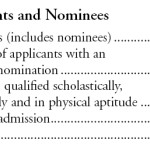October 13, 2012
How to Get Along (Critical Skill #4 for Future USNA Applicants)
If you read the freshman year critical skills post, you know this is the fourth. We’ve covered:
Getting along with people won’t get you in college on its own (especially colleges like the University of California  that don’t interview applicants), but the Naval Academy wants students who know how to talk to others, how to listen and compromise–all significant factors in ‘getting along’. The Naval Academy Admissions doesn’t take for granted that you can collaborate with others. They assign you a Blue and Gold officer who conducts a formal interview which is graded and reported to the Admissions Board. (More info on the B&G Interview here)
that don’t interview applicants), but the Naval Academy wants students who know how to talk to others, how to listen and compromise–all significant factors in ‘getting along’. The Naval Academy Admissions doesn’t take for granted that you can collaborate with others. They assign you a Blue and Gold officer who conducts a formal interview which is graded and reported to the Admissions Board. (More info on the B&G Interview here)
One of the other major hurdles unique to Military Academies is the Congressional Interview. This Board of highly-qualified individuals asks you questions, judges your answers and votes up or down. Without their approval, you won’t get into USNA. If there was every anyone you needed to get along with, it would be them.
So how do you get along? In Kindergarten they teach:
- take turns
- share
- cope with conflict without biting, hitting, kicking
Good start, but you’re in high school now. Time to dig a little deeper:
- Listen first. Listen with your ears and your eyes. Body language conveys 60-70% of a person’s communications whether they want to or not. Be aware if the person you’re chatting with misunderstood your comment,
 disagrees with you, or is distracted by something. Be sensitive, evaluate and then continue.
disagrees with you, or is distracted by something. Be sensitive, evaluate and then continue. - Think before you speak. Don’t chatter ‘off the cuff’. That’s for family or close friends. When you’re going after the dream of your lifetime, think about the question. Relate it to what has been said and then answer.
- Consider what you say. You are talking to strangers (well, maybe not. I’ll have a few suggestions in that area in a later post). You don’t know their political leanings, financial situation, religious preference. Be considerate of differences, understand people have a right to be different, and that’s a good thing for the world.
- Pick your words carefully. Make sure they mean what you mean. If someone is listening to you–and I assure you, the B&G Officer and your Congressional panel will be–they will hear the full impact of your words and want you to defend them. That may mean a simple telling of the truth, if you’ve said what you mean. Or, it might mean backtracking. No one hates, ‘Well, that’s not really what I meant’ more than the guy interviewing you. It sounds like you’re changing your opinion to get along.
- Know what you’re talking about. Most people enjoy a good argument, so if you disagree with whoever you’re talking with, be sure you have the facts and aren’t just repeating what you’ve heard. The former gives you authenticity and intelligence while the latter destroys your credibility.
Reread these ideas until you remember them, then practice them. Try out new situations, new groups at school, new clubs, and see what happens when you consider other people’s point of view before stating your own, when you watch their eyes and faces to see what they tell you. If you talk to people who seem to get along with everyone, you’ll find this is what they routinely do, as second nature. You can too with a bit of practice.
Follow USNA or Bust on Twitter
Jacqui Murray wrote Building a Midshipman, the story of her daughter’s journey from high school to United States Naval Academy. She is webmaster for six blogs, an Amazon Vine Voice book reviewer, a tech columnist for Examiner.com, Editorial Review Board member for ISTE’s Journal for Computing Teachers, Cisco guest blogger,IMS tech expert, and a weekly contributor to Write Anything. Currently, she’s editing a thriller for her agent that should be out to publishers this summer. Contact Jacqui at her writing office, WordDreams, or her tech lab, Ask a Tech Teacher.






